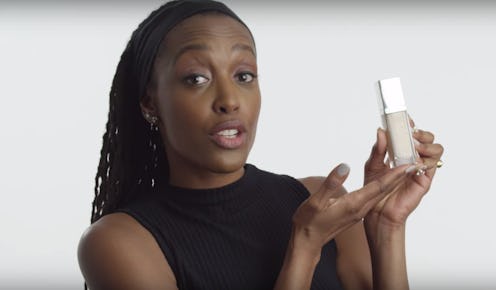
Beauty standards hurt all women, because no matter what, we're taught something about our looks are inadequate or at least could be better. But they particularly hurt women of color — because the "ideal" suspiciously coincides with what white people look like. The ways we reinforce racist beauty standards are often hard to detect, but the MTV video "The Problem w/ White Beauty Standards" spells out exactly how it works. In it, five women of color discuss what white beauty standards are, how they're perpetuated, and how they end up hurting everyone, particularly women of color.
"White beauty standards are when whiteness is the default and it becomes the cultural ideal for beauty," Feminist Ryan Gosling creator Danielle Henderson explains in the video. "The problem is that all these social messages you get about what is and who is beautiful influences who you think is beautiful." The video also includes MTV Decoded host Franchesca Ramsey, comedians Rekha Shankar and Lily Du, and makeup artist Delina Medhin.
Here are some subtle ways that white beauty standards are reinforced, according to the women in the video, and why they harm all women — because nobody can really live up to such a narrow definition of beauty:
1. Through Backhanded Compliments
If your way of complimenting someone is telling them that they don't really look like what they are, you're actually insulting them. "Are you mixed with something?" is one Ramsey gets, while Du hears "you have pretty big eyes for an Asian person." We should be suspicious of this notion that looking whiter makes you more attractive.
2. Through "Nude"-Colored Products
When bandages, makeup, stockings, and other products are designed to mimic a white person's skin by default, we teach people of color that they don't actually exist. Ramsey explains why calling this color "nude" is problematic: "Not all of us look like this when we're naked."
3. Through Skin-Lightening Products
Some of the most overtly racist products on the market are skin-lightening creams. (And no, bronzer and self-tanner are not the same, because they are not based on the notion that being white makes you less attractive.) "First, she was sad and dark-skinned. Now, she's scientifically more marketable," Shankar translates the before and after photos on this particular bottle.
4. Through "Professional" Standards For Hair
Beyoncé's phrase "good hair," Henderson explains, is used within the black community to talk about hair that's less curly, thick, and stereotypically black. Ramsey says she was warned that with her hair, she wouldn't be able to get a job. This proves that race is built into the way we talk about beauty, professionalism, and pretty much every area of our lives.
Watch the full video below:
Images: MTV News/YouTube(5)